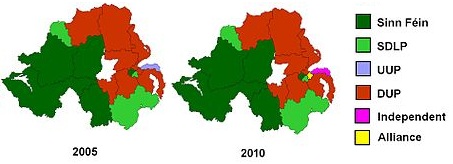The campaign for the May 2015 general elections is officially under way now in the United Kingdom. And barring a huge swing between now and the election, the results are going to be chaos.
Below are the March 30th projections from The Guardian’s election center (updated daily at the link)
https://twitter.com/GdnPolitics/status/582452523950321664
Labour are campaigning hard against the SNP (to try to regain marginally SNP-leaning constituencies in Scotland), but that will make it harder to work together after the election. Which is an important consideration, seeing as they’re basically the only two parties that will collectively have anywhere near a majority.
And the Lib Dems seem pretty averse to working with Labour and the SNP, but they can’t easily go back to the Conservatives either.
The Conservatives may well finish first but (under current polling) have basically no shot of leading a government anyway, even with UKIP and the Lib Dems and the DUP. I mean…unless they’re planning to go into coalition with Labour or the SNP, which is beyond unlikely.
So that means…a big swing in favor of either Labour or the Conservatives is probably the only thing now that can prevent a totally bananas outcome or an irredeemably hung parliament.



